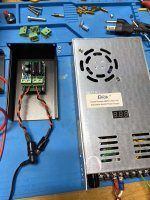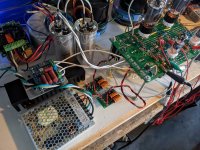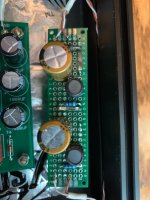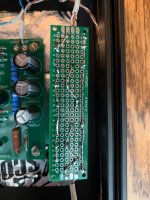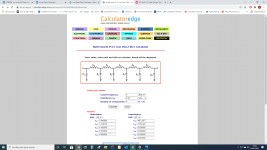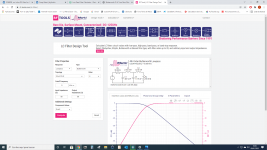So, you recommend scratch-building after all (I don't have the skills or the component parts) :-(
I was hoping to buy one of these PO89ZB -
Does anyone on the board have a spare you could sell me?
P.S. do you really think Altec Lansing would use a noisy power supply for their $300 speaker?
Thanks
I was hoping to buy one of these PO89ZB -
Does anyone on the board have a spare you could sell me?
P.S. do you really think Altec Lansing would use a noisy power supply for their $300 speaker?
Thanks
I just found an 18vdc ("linear") wall wart in my boxes of spare parts.
Even though the ripple isnt as low as the SMPS, is there any reason NOT to use it with my crossover(which has a LDO regulator on-board)?
Thanks
Even though the ripple isnt as low as the SMPS, is there any reason NOT to use it with my crossover(which has a LDO regulator on-board)?
Thanks
The inductor must be 120uH or can be something between 100-150uH?If you are a self-sufficient, brave, confident, and experienced DIY builder, you could use the SMPS filter design which Nelson Pass created for his DIY VFET project. That project draws a total of about 4 amps from the SMPS, and his filter circuit design specifies a Bourns inductor which is rated for 5 amps.
You'd either lay out your own PCB for it, or else build the circuit on vectorboard with beefy point to point wiring.
_
TIA
Felipe
I'll be ordering the parts to restock the kit in the store this weekSo, you recommend scratch-building after all (I don't have the skills or the component parts) :-(
I was hoping to buy one of these PO89ZB -
Does anyone on the board have a spare you could sell me?
P.S. do you really think Altec Lansing would use a noisy power supply for their $300 speaker?
Thanks
I use a couple of these on various B1s including the B1K. The B1K is VERY susceptible to micro phonics and in the oddest ways which can depend literally on the NuTube or how you've dampened the micro phonics. If you check the thread, you'll find that some people (myself included) have seen results that vary quite a bit from unit to unit, and there are other suggestions for arresting the micro phonics. Based on my experience, consider that the filter could be arresting enough of the noise from the supply that was dominating what you were hearing, and that the micro phonic "wasp buzz" was always there. This is why I strongly recommend hooking this up and measuring the results as Mark has shown earlier in the thread. At least that can help narrow down the possibilities.I have a very curious issue using this with my B1Korg. I have two of these filters in series in a little box with a flying lead so that I can use it on all of my various preamps and headphone amps. It has been a positive addition to every device so far.
With the B1Korg, I can hear a low level wasp-like buzz when it's connected. It disappears once the filter is removed. Has anyone else had this experience?
I've recently done just that for a supply I am using to drive the Starving Student HPA 2 and it works (and measures) like a champ.A very lovely enclosure! Congratulations.
One way to get barrel connectors with heavy gauge wires, is to buy them already pre-built into cables. For example, I bought the one below, specifically because its conductors are size 18-AWG. Cut to desired length, strip off the insulation, done.
DC power adapter extension cable @ Amazon
Attachments
Will organic capacitors such as the Panasonic EEH-AZS1V471B with an ESR of 11mOhms work even better?
I have audio circuit where the load circuit starts oscillating causing the power supply to also oscillate.
Will the PO89ZB keep this from happening?
I have audio circuit where the load circuit starts oscillating causing the power supply to also oscillate.
Will the PO89ZB keep this from happening?
Hi Mark I found this thread yesterday, thank you for putting it together.
I've been looking for a cost effective solution for cleaning up the power to a CA Dacmagic this looks perfect for that requirement.
Are the pcbs and components still available, particularly here in the UK?
I've been looking for a cost effective solution for cleaning up the power to a CA Dacmagic this looks perfect for that requirement.
Are the pcbs and components still available, particularly here in the UK?
I’ll be building 2 of these on one piece of perfboard in a single enclosure (small metal mint tin) for my ACP+ / MiniACA stack.
Do I need to do anything in particular with regards to layout to maintain the performance of the PCB version?
Do I need to do anything in particular with regards to layout to maintain the performance of the PCB version?
Quote:
"I'll be ordering the parts to restock the kit in the store this week"
Please advise when the kits are available for purchase again. Thanks
"I'll be ordering the parts to restock the kit in the store this week"
Please advise when the kits are available for purchase again. Thanks
Yes, lower ESR is better in this PCB design ... if the capacitor will fit on the board! To check, go to Mouser.com and enter the Mouser part number of the original capacitors {part # is in post #}. This will take you to a Mouser sales page which includes a link to the engineering datasheet. Look in the datasheet to find (a) the capacitor's lead spacing; (b) the body diameter; (c) the length of the capacitor body. If the proposed new capacitor will fit in that same space, sure, give it a try.
I doubt that this lowpass filter will make an oscillating load circuit cease oscillating.
I doubt that this lowpass filter will make an oscillating load circuit cease oscillating.
I have been working on a BETA build of Tubelab's UNSET design and wanted to try out using a SMPS for the tube heater supplies. Doing the normal internet research on using a SMPS to power tube heaters yields much of the same discussions around the evils of using a SMPS for audio devices as with solid state amps so I thought I would try 2 of these neat little filters between the Meanwell LRS-100-12 I am using and the tube heaters. The driver tubes take 12V at 600mA and the output tubes take 12V at 2.5A. I have one PO89ZB between the SMPS and driver tubes and one between the SMPS and output tubes. Setup like this I see a 0.2V difference between the output of the 2 filters with the driver tubes getting 12.7V and the output tubes getting 12.5V. The voltages are well within spec for the tubes and everything is functioning well plus the amp is sounding good. All fun stuff!
Attachments
One other note after that photo was taken I was feeling a little paranoid about having a PSU capable of 8.5A feeding 2 devices rated for a max of 3A each even though the load is less, so I put a 3A slow blow fuse on the input side of each PO89ZB.
Wow so generous to share this pcb design. I just ordered 10 boards for myself to keep on hand for current and future projects.
Thanks so much
Thanks so much
That one was intented for Mark, but TBH that shouldn't be too difficult to calculate ;-)
In case of, search function is your friend: I did a post on that (Fc, order, 2 filters cascaded), I believe that was in the VFET thread...
Claude
In case of, search function is your friend: I did a post on that (Fc, order, 2 filters cascaded), I believe that was in the VFET thread...
Claude
This is very easy to do point-to-point. P2P is lots of fun and if you have never done before this is a good start.So, you recommend scratch-building after all (I don't have the skills or the component parts) :-(
I was hoping to buy one of these PO89ZB -
Does anyone on the board have a spare you could sell me?
P.S. do you really think Altec Lansing would use a noisy power supply for their $300 speaker?
Thanks
You can work it out on paper beforehand or I use a pcb layout program to work out which legs of components to connect, just layout everything and make the traces all on one layer (or you can even use jumpers to tie things over on the other side of the board) - I use the free version of Eagle. Here are some pics of my P2P PO89ZB. you can see it does not take up much room.
Attachments
How is input impedance important or even relevant? Why on earth would anyone imagine it is 50 ohms ?
- Home
- Source & Line
- Analog Line Level
- PO89ZB, an inline DC filter for SMPS wall warts. Preamps, HPA, Korg NuTube, etc
